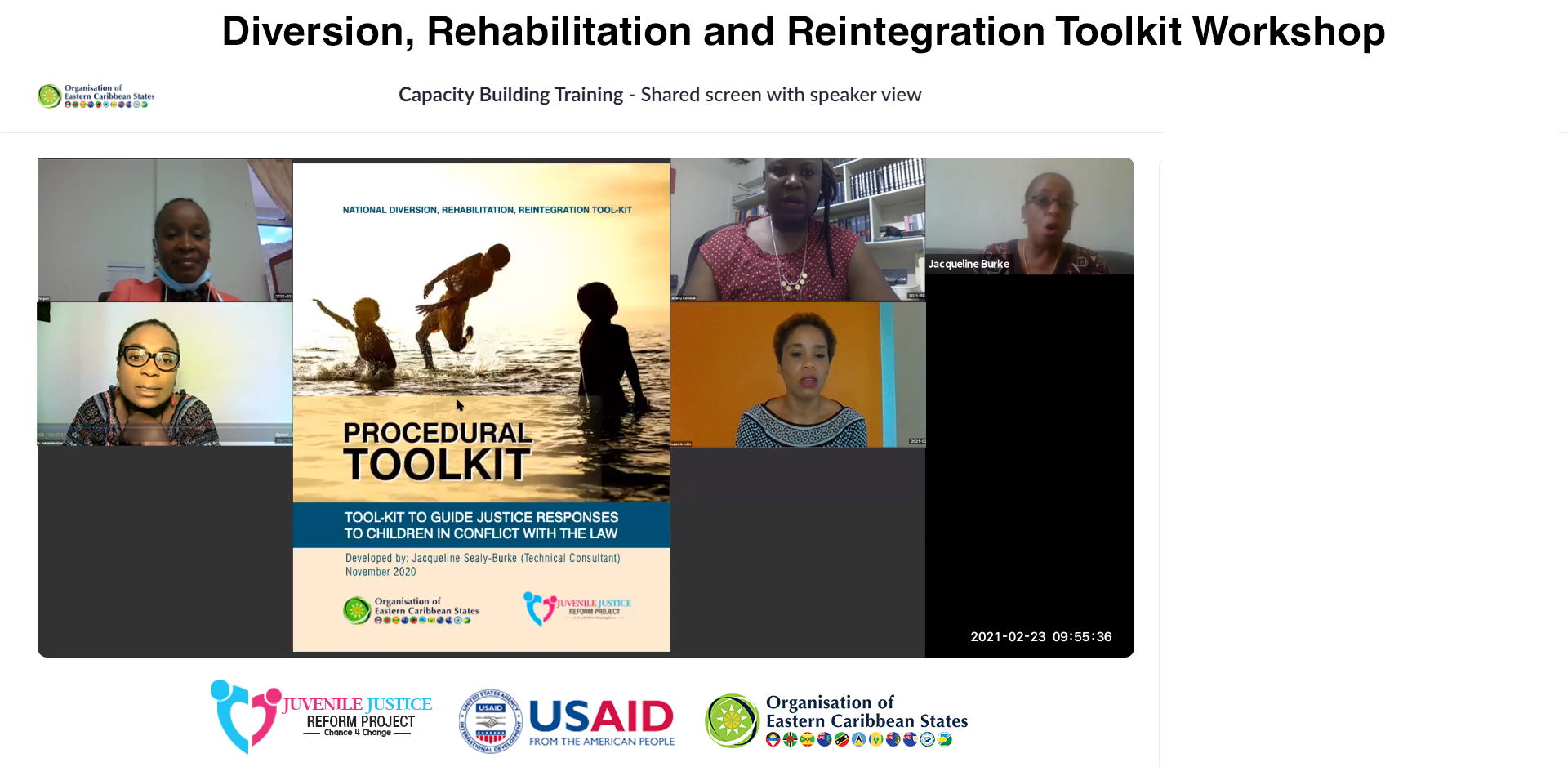Standards, Policy and Implementation guiding Diversion, Rehabilitation and Reintegration of Youth in the Justice System improved through Toolkit
OECS Media Release
Six OECS Member States - Antigua and Barbuda, the Commonwealth of Dominica, Grenada, Saint Lucia, St. Kitts and Nevis and Saint Vincent and the Grenadines - now have a toolkit to guide the countries’ use of diversion, rehabilitation, and reintegration.
The Toolkit, which was developed in September 2020 by the USAID/OECS Juvenile Justice Reform Project (JJRP II), puts in place a standardized approach to diversion, rehabilitation, and reintegration of youth in conflict with the law, that is in keeping with international standards. It also provides practical information to help inform the development of standard operating procedures in each Member State.
A virtual workshop was hosted on February 23, 2021 to measure stakeholders’ understanding of the toolkit and to provide an in-depth understanding of its uses. The workshop highlighted the major considerations for diversion, rehabilitation, and reintegration both at a policy and implementation level, a proposed “National Mechanism for the Effective Implementation of Juvenile Justice” and the role of monitoring and evaluation. Stakeholders who attended the workshop included policy and programming stakeholders, probation officers, counsellors, staff working in facilities catering to youth and senior police officers with responsibility for youth and children matters.
Speaking on the impact of the training session, JJRP II Technical Officer, Shahini Gravillis said,
“This workshop is very timely given that the JJRP II project comes to an end June 30th, 2021. This transfer of knowledge is critical to enable key stakeholders to carry the baton for Juvenile Justice Reform by ensuring that they are better prepared to formulate policy and implement the core tenets of reform according to international standards across all member states. The stakeholders seemed to have come away from the workshop more prepared and enthused to execute the juvenile justice reform measures, as we are all keen to ensure that children in conflict with the law are meted out appropriate and fair treatment as per the new legislation.”
Alina Auguste, Probation Officer – Department of Probation and Parole (Saint Lucia), who attended the workshop noted,
“It was a really important workshop for us, as it tied together all of the work that we have collectively done over the years on the Juvenile Justice Reform Project. The focus on reintegration was good as we have had a lot of training in diversion and rehabilitation, and I feel it was necessary to give reintegration this focus. We were trained to train others in the use of the toolkit which will ensure sustainability as we take over the reigns of juvenile justice reform in our respective countries. Overall, I would say that it was a holistic workshop that served as a culmination of the entire juvenile justice reform process.”
About OECS/USAID Juvenile Justice Reform Project Phase II
The Juvenile Justice Reform Project (JJRP) Phase II, funded by the United States Agency for International Development (USAID), and being implemented by the OECS Commission, deals specifically with children in conflict with the law and the provision of diversion, rehabilitation and reintegration mechanisms for assisting children in the six (6) OECS independent Member States of Antigua and Barbuda, the Commonwealth of Dominica, Grenada, St Kitts and Nevis, Saint Lucia and Saint Vincent and the Grenadines. Over the four years of JJRP Phase II, some key achievements include:
- Child Justice legislation passed in Antigua and Barbuda, Grenada, Saint Lucia, St. Kitts and Nevis and Saint Vincent and the Grenadines.
- A Legacy model and framework to guide the use of diversion, rehabilitation and reintegration has been developed and is being adopted in all of the countries.
- Diversion and rehabilitation options being actively supported within partner countries.
- Since 2016, 442 children have been diverted/given alternatives from arrest or custodial sentences, representing a more than 300 percent increase in the use of diversion.
- 215 children in conflict with the law completed Aggression Replacement Training (ART®).
- More than 1,400 service providers have been trained to improve the diversion, rehabilitation, and reintegration services provided to children in conflict with the law and their families.
